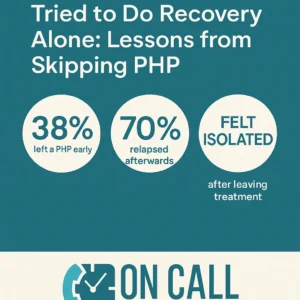Even if you tell yourself you’re doing fine, there’s something quietly painful about disappearing from treatment. You avoid group chats. You stop replying to texts. And the longer you stay gone, the harder it feels to return.
I ghosted a partial hospitalization program in Waltham when things started feeling too intense. I told myself I needed space. But the truth? I was scared. I was ashamed. And I thought leaving meant I’d burned my chance at getting better.
Spoiler: I hadn’t.
If you’re hovering in that in-between place—part of you wants help, part of you is afraid to go back—On Call’s PHP in Waltham, MA might be the kind of reentry point you didn’t think was still open.
Here’s what I learned the hard way—and why it’s not too late for you either.
I Thought “Doing It Alone” Would Make Me Stronger
At first, skipping PHP felt like taking control. I was tired of talking. Tired of crying in group. Tired of feeling like I was always on the edge of falling apart.
I told myself I could figure it out on my own. No check-ins. No structure. No one watching.
But here’s what I didn’t expect: the quiet started to hurt. No one asking where I was. No one noticing when I pulled away. The freedom I thought I wanted felt more like abandonment. Not from others—but from myself.
Ghosting Isn’t Just About Missing Appointments
When I left treatment, I didn’t just ghost the program. I ghosted the version of me that wanted to get better. I stopped journaling. Stopped doing the things that used to help. Even basic stuff—showering, eating real meals—started slipping.
One night I stood in my kitchen staring at an empty cereal box, and it hit me: This isn’t freedom. This is collapse.
But by then, I felt so far gone that calling back seemed impossible.
PHP Was More Than Structure—It Was My Anchor
Here’s the thing people don’t always tell you about day treatment. PHP isn’t just about “doing the work.” It’s about having a rhythm that keeps you grounded when your inner world is chaos.
It gave me places to show up when I didn’t feel like showing up for myself. It gave me people who noticed when I was off. And it gave me enough space between sessions to breathe—but not disappear.
Without it, every day felt like walking a tightrope without a net.

The Shame of Leaving Made Me Stay Gone Too Long
Every time I thought about going back, my stomach dropped.
What would they think of me? Would I be welcomed—or scolded?
I rehearsed explanations in my head. I wanted to say the “right thing” to earn my way back in.
But when I finally called, no one asked for an apology. They just said: “We’re glad you reached out.”
That one sentence broke something open. It reminded me that shame only wins if you let it keep you isolated.
The Second Time Around, I Showed Up Differently
When I reentered PHP, I wasn’t trying to “do it perfectly.” I was just trying to be honest.
I told my group what had happened. I told them I ghosted, that I felt like I had failed. One person looked at me and said, “Yeah. Me too.”
We laughed. And I cried. And for the first time in weeks, I felt real again.
This time, I knew what to protect. Not the image of being “strong”—but the fragile, brave part of me that wanted to stay alive and keep trying.
What I Wish I Knew Before I Left
- You don’t have to be doing well to come back.
There’s no GPA in recovery. You’re allowed to return messy. - Treatment isn’t a pass/fail.
You didn’t fail PHP just because you left early. It’s not school—it’s support. - The program isn’t mad at you.
Good providers, like On Call Treatment in Waltham, know people drop out. They expect it. And they don’t hold it against you. - Being gone doesn’t erase the progress you made.
Every insight, every step—it’s still part of your story. You don’t lose that just because you hit pause.
“I thought I had to ‘earn’ my way back in. Turns out, they were just glad I showed up again.”
– PHP Client, 2023
Coming Back Isn’t Weak. It’s Brave.
If you’re reading this and you’ve left a program, ghosted your therapist, or just quietly stopped trying—I want you to hear this:
You’re still welcome. You haven’t missed your window. You’re not too far gone.
Coming back isn’t admitting failure. It’s choosing yourself again.
And if that first call feels like too much, try this: write the number down. Keep it close. Look at it when you’re ready. It’s not a test. It’s a lifeline.
FAQ: Returning to PHP and Understanding Day Treatment
What is PHP, and how is it different from inpatient or IOP?
PHP (Partial Hospitalization Program) is a structured treatment program that offers full days of support (typically 5–6 hours per day) without requiring an overnight stay. It’s more intensive than IOP (Intensive Outpatient Program), but less restrictive than inpatient care. Think of it as a bridge between 24/7 care and everyday life.
Can I come back to PHP if I left early or without notice?
Yes. Many programs, including On Call’s PHP in Waltham, understand that pauses happen. Re-entry is possible—and you won’t be punished or shamed. Just reach out.
Do I have to start over completely if I rejoin?
Not necessarily. Your care team will assess where you’re at emotionally and clinically. Sometimes that means picking up where you left off. Sometimes a fresh start feels better. Either way, your progress isn’t erased.
What if I relapsed or got worse while I was gone?
That’s okay. Recovery isn’t linear. Your clinical team is trained to support people wherever they are. You’re not the only one who’s needed a reset.
Is it weird to return after ghosting a group?
It might feel awkward for a minute—but it won’t stay that way. In most PHP groups, everyone knows what it’s like to struggle with consistency. Vulnerability is welcome. Honesty is respected.
You’re Still Allowed to Come Back
No matter how long you’ve been gone. No matter how low things feel.
📞 Call (833) 287-7223 or visit our Waltham PHP page to see if returning to treatment could be your next brave step.
You don’t have to do it alone this time.

